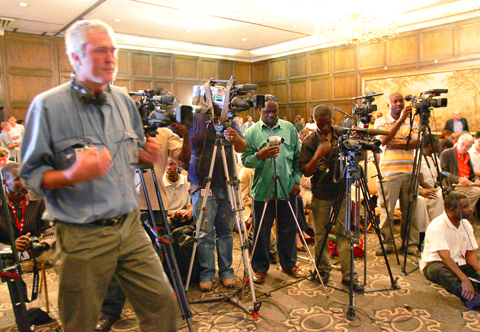Zimbabwean authorities have charged two foreign journalists arrested in Harare with breaching the country’s tough media laws by reporting without accreditation, police said yesterday.
New York Times correspondent Barry Bearak, 58, and a 45-year-old journalist from Britain were among four people picked up on Thursday by police at a Harare guest house.
“They have both been charged for practicing without accreditation but the other two will be released soon after screening,” national police spokesman Wayne Bvudzijena said.

PHOTO: AFP
“We have so many other foreign journalists who have followed the laid-down procedures and are practicing legally and here we have two people who thought they were a law unto themselves,” Bvudzijena said.
There was no information on the identity of the other two journalists detained.
Zimbabwean authorities barred most foreign media from covering last month’s general elections and had warned they would deal severely with journalists who sneaked into the country and were caught operating illegally.
However a number of news organizations, including the BBC, have been filing reports from correspondents operating under cover.
Zimbabwe passed a media law on the eve of the last presidential elections in 2002 that has been invoked to expel foreign correspondents and shut down at least four independent newspapers.
The situation is tense in the capital as Zimbaweans await results from the presidential elections in which Zimbabwean President Robert Mugabe faced the toughest challenge to his nearly three-decade rule.
The opposition Movement for Democratic Change claims its leader Morgan Tsvangirai won the presidential poll outright.
There was still no official word on the outcome six days after the polls, although the election commission has won control of parliament.
Mugabe’s ruling Zimbabwe African National Union — Patriotic Front has indicated it is gearing for a second round run-off and called a meeting of its politburo yesterday to discuss the election outcome.
New York Times executive editor Bill Keller confirmed on Thursday that Bearak, who won a Pulitzer prize in 2002 for his reporting war-torn Afghanistan, had been detained but did not know where he was being held.
“We are making every effort to ascertain his status, to assure that he is safe and being well treated, and to secure his prompt release,” Keller said in a statement.
The US said it was “troubled” by news of the arrests.
“We are troubled by reports we are hearing on the ground in Zimbabwe,” National Security Council spokesman Gordon Johndroe said. “Journalists and NGOs should be permitted to do their work.”

VAGUE: The criteria of the amnesty remain unclear, but it would cover political violence from 1999 to today, and those convicted of murder or drug trafficking would not qualify Venezuelan Acting President Delcy Rodriguez on Friday announced an amnesty bill that could lead to the release of hundreds of prisoners, including opposition leaders, journalists and human rights activists detained for political reasons. The measure had long been sought by the US-backed opposition. It is the latest concession Rodriguez has made since taking the reins of the country on Jan. 3 after the brazen seizure of then-Venezuelan president Nicolas Maduro. Rodriguez told a gathering of justices, magistrates, ministers, military brass and other government leaders that the ruling party-controlled Venezuelan National Assembly would take up the bill with urgency. Rodriguez also announced the shutdown

Civil society leaders and members of a left-wing coalition yesterday filed impeachment complaints against Philippine Vice President Sara Duterte, restarting a process sidelined by the Supreme Court last year. Both cases accuse Duterte of misusing public funds during her term as education secretary, while one revives allegations that she threatened to assassinate former ally Philippine President Ferdinand Marcos Jr. The filings come on the same day that a committee in the House of Representatives was to begin hearings into impeachment complaints against Marcos, accused of corruption tied to a spiraling scandal over bogus flood control projects. Under the constitution, an impeachment by the

Exiled Tibetans began a unique global election yesterday for a government representing a homeland many have never seen, as part of a democratic exercise voters say carries great weight. From red-robed Buddhist monks in the snowy Himalayas, to political exiles in megacities across South Asia, to refugees in Australia, Europe and North America, voting takes place in 27 countries — but not China. “Elections ... show that the struggle for Tibet’s freedom and independence continues from generation to generation,” said candidate Gyaltsen Chokye, 33, who is based in the Indian hill-town of Dharamsala, headquarters of the government-in-exile, the Central Tibetan Administration (CTA). It

A Virginia man having an affair with the family’s Brazilian au pair on Monday was found guilty of murdering his wife and another man that prosecutors say was lured to the house as a fall guy. Brendan Banfield, a former Internal Revenue Service law enforcement officer, told police he came across Joseph Ryan attacking his wife, Christine Banfield, with a knife on the morning of Feb. 24, 2023. He shot Ryan and then Juliana Magalhaes, the au pair, shot him, too, but officials argued in court that the story was too good to be true, telling jurors that Brendan Banfield set